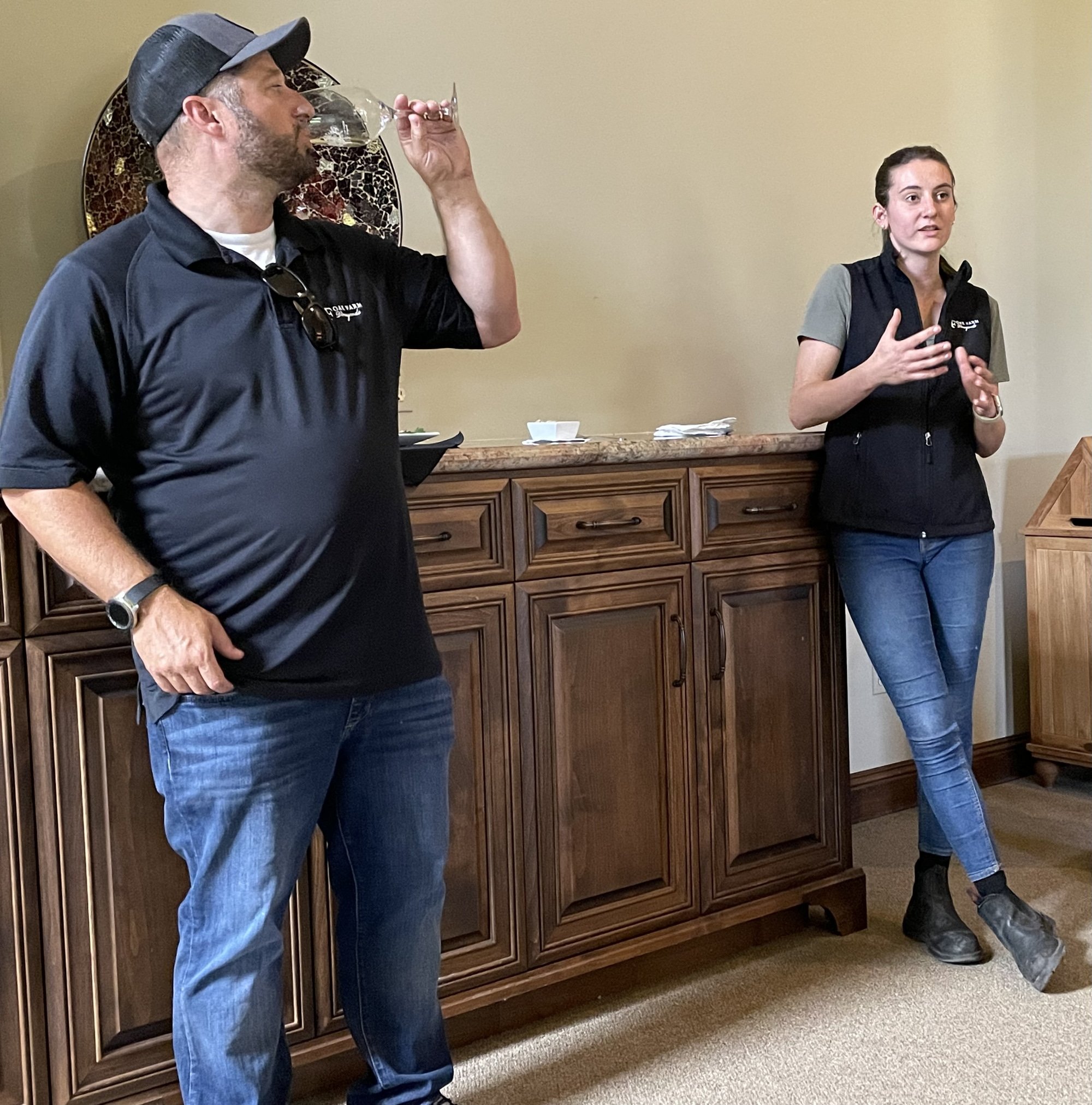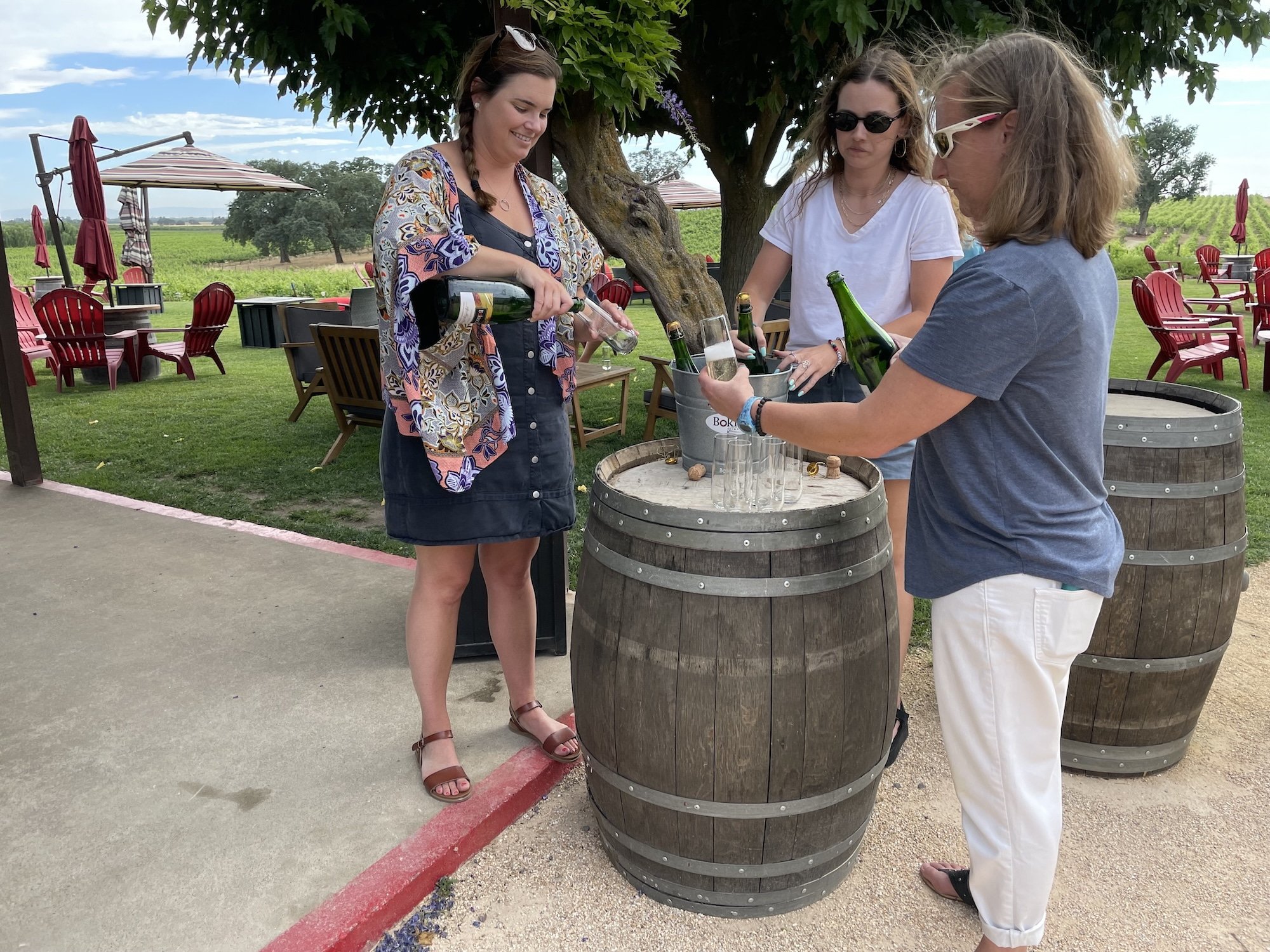LODI RULES: California’s Original Sustainable Wine Growing Program
Just south of Sacramento, Lodi is one of the few American wine regions with vines that are more than a century old. It’s also home to the LODI RULES Sustainable Winegrowing Program.
With accreditation by world-renowned scientists, California farmers created America’s original sustainable wine-growing program in the late 1990s. It incorporates more than 100 sustainability practices - from how grapes are grown to how a farm operates. Today, upwards of 1,200 vineyards, from California to Washington state participate in the program. The program serves as a model for other wineries around the country and the world.
LODI RULES Background
Markus and Liz Bokisch in vineyard photo credit Bokisch Vineyards
Markus Bokisch along with his wife Liz owns Bokisch Vineyards and was among the authors of the LODI RULES first edition. “I thought the idea of third-party certification for sustainability was awesome,” he says. “This would be the first one in California, focused on wine grapes and a completely transparent chain of custody of the grapes.”
Their vineyard began with vine cuttings from Spain in 1996 and the winery opened four years later. Award-winning varietals incorporate estate grown and organically farmed fruit from their Bokisch Vineyards, Terra Alta Vineyard, Miravet and (estate vineyard) Las Cerezas.
LangeTwins grazing sheep
At LangeTwins Family Winery & Vineyards Kendra Altnow, the daughter of co-founder, Brad Lange is the Sustainability Manager. With on-the-ground and marketing experience, she began her current role about two years ago. Today, this fifth generation farming operation includes two generations and nine family members. “We’re also a management company with 1,200 family-owned acres,” Altnow says.
The winery has participated in LODI RULES since its inception, and their participation is deeply personal. “My uncle Randy was part of writing the original workbook,” Altnow says. “My cousin Aaron was then involved in re-visioning of the workbook.”
Oak Farms owner Dan Panella and winemaker Marilia Nimis-Schrader
With French and Italian family heritage, third generation farmer Dan Panella replanted 60 acres of vineyards at Oak Farm Vineyards during 2012. Today the Lodi company crafts wines from 14 different varieties of estate grapes plus selectively sourced fruit. Round Valley Ranches, Inc. manages the vineyard. “We are a family business and vineyard management company,” says Aaron Shinn, owner, and head of the company. “We manage day-to-day operations and work to achieve desired varietal-specific quality parameters.”
Shinn explains that LODI RULES was initially a pilot program, from very forward-thinking members of the Lodi wine community, which would showcase participating farmers’ desire to take care of the land. “And people want to know how grapes are getting in the bottle while – if not helping – at least not harming the environment,” he adds. “If you want to be at the forefront of something you have to look at the way things are trending, and LODI RULES is a great vehicle for that.”
LODI RULES Program Guidelines Highlights
Encouraging biodiversity and stewardship
Under the Bokisch ‘umbrella,’ “We are changing our owl boxes for brand new ones that will make them more habitable, including perches and a little balcony outside the door for when the owls learn to fly,” Markus says. “The boxes face the northeast, to minimize sun exposure and heat inside, and double roofing keeps the boxes cooler. Owls constantly migrate to where males can find as many gophers as possible - eating up to 40 per week.”
Bokisch maintains heritage oak trees, or replaces them with new trees from their acorns, beside the older trees. “Blue oaks are very drought hearty, and they are the top notch tree of this area,” Markus says. “We also create animal corridors so they can follow paths outside of the vineyards, while skirting oak trees.”
Oak Farm Vineyards photo credit Round Valley Ranches, Inc.
Oak Farm Vineyards and Round Valley Ranches use owl boxes too, which promote natural pest control. In addition, “Oak Farm prides themselves on maintaining trees around the property that provide habitat,” Shinn says. “And cover crops we plant may provide habitat to butterflies and ladybugs, help with organic nitrogen, and reduce soil temperature.”
LangeTwins Family Winery & Vineyards has nurtured oak trees along the river, planted native bushes, and built boxes for nesting wood ducks. “We also have areas outside the vineyard where we plant pollinator [zones],” Altnow says. “In total we have restored about 38 acres of native areas over 20+ years.”
Reducing the need for pesticides
Kelli Mettler Costamagna of Mettler Family Vineyards, a LODI RULES certified winery
At Oak Farm Vineyards, the Round Valley Ranches team employs Integrated Pest Management based on allowable pesticide thresholds. “Just because there are spider mites in the vineyard doesn’t mean you necessarily need to get rid of them,” Shinn says. “Also, in our pesticide environmental assessment system, we only use those that fall below a certain level of toxicity for people.”
LangeTwins Family Winery & Vineyards seeks to regenerate soil by building organic matter and maximizing water penetration, while managing water usage and efficiency. Cover crops planted between grape vines promote water availability and erosion control, too.
“We also contract with Valley Grazing, and their 1,300 sheep graze within a portion of our vineyards, versus having mowing done,” Altnow says. “From a landscape perspective, we know there is additional biodiversity of species coming back, including bobcats, quail, turkeys, and deer.”
Bokisch says their vineyards aim to use low-toxicity pesticides per the PEAS (Pesticide Environmental Assessment System) model. “We do have to spray more frequently, such as mineral oils, which are ‘softer’ [regarding] mammalian toxicity,” Bokish says. “We also use pheromone traps for mating disruption such as with the vine mealy bug – one of the worst pests in California wine country.”
Care for people who work the land by ensuring safe working conditions and investing in their education
Eliza Hess, assistant winemaker with Heather Pyle Lucas, winemaker and owner of The Lucas Winery
Shinn says his company has quite a history of longtime employees, which he attributes to several strategies. “We have monthly safety meetings, and we give bonuses that reward safe working behavior. We also have harvest incentive bonus systems, and we are typically paying higher wages during harvest.”
LangeTwins Family Winery & Vineyards encourages continuing education among employees and gives them time to attend conferences. “We have management training opportunities among our staff, too,” Altnow says. “There are team lunches and happy hours, with harvest lunches during our busiest time of the year.”
Bokisch says their winery also has an education program in place so employees can take courses related to what they do, such as herbicide applications, barrel maintenance, and more. “Two years ago, four of our irrigators attended an irrigation conference in Los Angeles. A lot of our vineyard employees also participate in our winery and take an active role in cooking for our wine club members.”
Engage with and support surrounding neighborhoods
Bokisch winermaker Elyse Perry and guests at the winery
Shinn says communication with surrounding neighborhoods is key to effective operations under LODI RULES. “Having open lines of communication with neighbors and not having land wars is important. Dan includes his neighbors in his wine club, too.”
Altnow mentioned starting a group of farmers to raise awareness regarding how vineyard practices of others impacted their own (such as viruses that can move from block to block). “The group is called Jahant Appellation Alliance,*” she says. “And we have previously had a neighborhood night out at the winery.”
Bokisch Vineyards typically hires full-time employees who will more likely rent or purchase homes in the community. “Four times a year we throw a Wine Club party, but the spring and the fall party also has a local Atkins Road table for our neighbors,” Bokisch says. “We’ve had about 80 percent success rate in getting them to sit down for a glass of wine and be part of the ‘family.’”
But participating in LODI RULES may pose some challenges. “One, in my operation, is marketing,” Shinn says. “We pay to be part of the program. There are limited numbers of buyers in the market today, who don’t care to pay a higher premium, so we are left with a desire to still tell our story and showcase what we’re doing to be sustainable and long-lasting. But there are some distribution challenges and an oversupply of product.”
“We’ve been farming in a sustainable manner since before the program started,” Altnow says. “The challenge comes in the paperwork and the record-keeping. We’re audited by a third party, on an annual basis.”
“LODI RULES is extremely rigorous, based on a point program – and far more rigorous than organic certification,” Bokisch says. Although he likes the rigor, Bokisch agrees there’s an enormous amount of data collection involved, to prove “…what you’re doing is working.”
LODI RULES practices consider the people you’re working with and your business management, too, Altnow says. “I think that’s what’s really important.” Shinn believes, “A person has to come to their own realization about the way things are going, whether s/he wants to be in or out [of this program] and what the ramifications of that decision are.”
“In the United States, we are behind Europe with regard to knowing where our fruit comes from,” Bokisch says. “But more and more, consumers are going to want to know the chain of custody for their wine. I truly believe that, because of the rigorous nature of LODI RULES, these growers and wineries will rise to the top of sustainability efforts.”
The Jahant AVA is a sub-appellation of the Lodi AVA.








